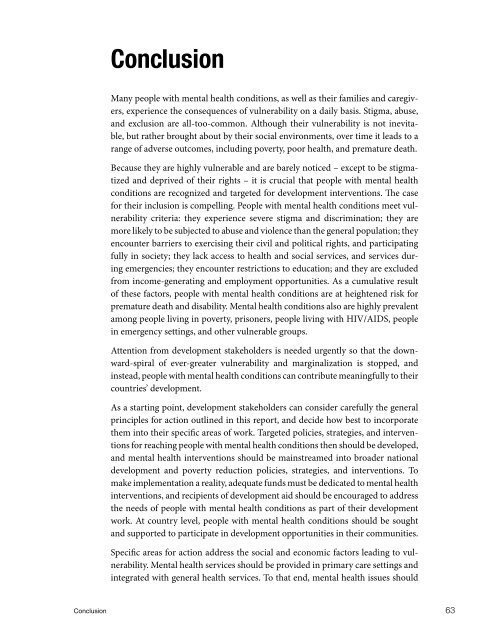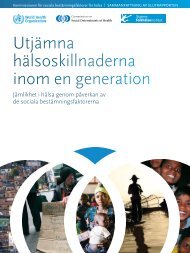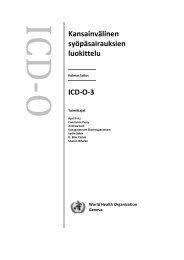MENTAL HEALTH AND DEVELOPMENT: - libdoc.who.int - World ...
MENTAL HEALTH AND DEVELOPMENT: - libdoc.who.int - World ...
MENTAL HEALTH AND DEVELOPMENT: - libdoc.who.int - World ...
Create successful ePaper yourself
Turn your PDF publications into a flip-book with our unique Google optimized e-Paper software.
Conclusion<br />
Conclusion<br />
Many people with mental health conditions, as well as their families and caregivers,<br />
experience the consequences of vulnerability on a daily basis. Stigma, abuse,<br />
and exclusion are all-too-common. Although their vulnerability is not inevitable,<br />
but rather brought about by their social environments, over time it leads to a<br />
range of adverse outcomes, including poverty, poor health, and premature death.<br />
Because they are highly vulnerable and are barely noticed – except to be stigmatized<br />
and deprived of their rights – it is crucial that people with mental health<br />
conditions are recognized and targeted for development <strong>int</strong>erventions. The case<br />
for their inclusion is compelling. People with mental health conditions meet vulnerability<br />
criteria: they experience severe stigma and discrimination; they are<br />
more likely to be subjected to abuse and violence than the general population; they<br />
encounter barriers to exercising their civil and political rights, and participating<br />
fully in society; they lack access to health and social services, and services during<br />
emergencies; they encounter restrictions to education; and they are excluded<br />
from income-generating and employment opportunities. As a cumulative result<br />
of these factors, people with mental health conditions are at heightened risk for<br />
premature death and disability. Mental health conditions also are highly prevalent<br />
among people living in poverty, prisoners, people living with HIV/AIDS, people<br />
in emergency settings, and other vulnerable groups.<br />
Attention from development stakeholders is needed urgently so that the downward-spiral<br />
of ever-greater vulnerability and marginalization is stopped, and<br />
instead, people with mental health conditions can contribute meaningfully to their<br />
countries’ development.<br />
As a starting po<strong>int</strong>, development stakeholders can consider carefully the general<br />
principles for action outlined in this report, and decide how best to incorporate<br />
them <strong>int</strong>o their specific areas of work. Targeted policies, strategies, and <strong>int</strong>erventions<br />
for reaching people with mental health conditions then should be developed,<br />
and mental health <strong>int</strong>erventions should be mainstreamed <strong>int</strong>o broader national<br />
development and poverty reduction policies, strategies, and <strong>int</strong>erventions. To<br />
make implementation a reality, adequate funds must be dedicated to mental health<br />
<strong>int</strong>erventions, and recipients of development aid should be encouraged to address<br />
the needs of people with mental health conditions as part of their development<br />
work. At country level, people with mental health conditions should be sought<br />
and supported to participate in development opportunities in their communities.<br />
Specific areas for action address the social and economic factors leading to vulnerability.<br />
Mental health services should be provided in primary care settings and<br />
<strong>int</strong>egrated with general health services. To that end, mental health issues should<br />
63

















